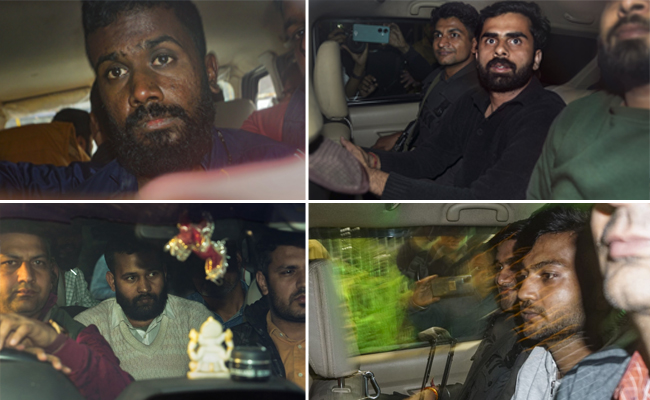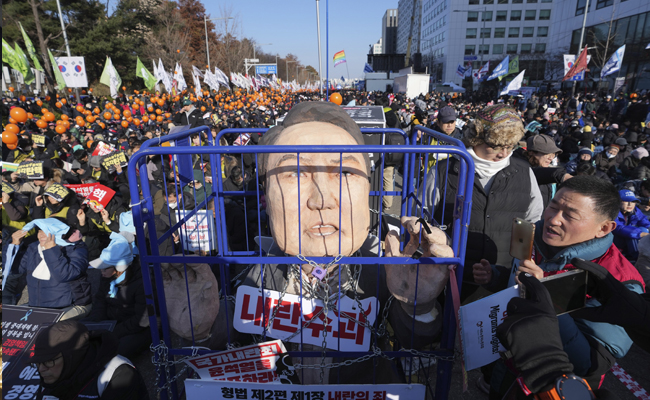New Delhi (PTI): The December 13, 2023 Parliament security breach accused wanted to discredit India's democracy, gain instant global fame, usurp power and achieve "richness and glory" by targeting the "very symbol of democracy", according to the chargesheet filed in the court by Delhi Police.
The accused first met on social media and planned their move for nearly two years before executing it last year on the anniversary of the 2001 Parliament attack. According to the chargesheet, a source said, their first in-person meeting was held in February, 2022 at Mysuru.
Citing from the chargesheet, sources told PTI, that in total they held five meetings in Mysuru, Gurugram and Delhi to decided finalise their plan and arrive at a modus operandi.
The chargesheet, spread over 1,000 pages, was filed before the Patiala House Court in June and the court took its cognisance last month. A supplementary was filed in July.
The chargesheet mentioned that the group of young people, led by Manoranjan D, a resident of Karnataka, met on social media.
Manoranjan is among the six accused arrested by the Delhi Police Special Cell, sources said.
Manoranjan, according to the chargesheet, is suspected to be among the main conspirators of the parliament breach, who allegedly "instigated and motivated" the young people by promising them "richness, glory and wealth" and by targeting the "very symbol of democracy".
While citing the chargesheet, a source said that driven by his "ultra Maoist-inspired thinking" Manoranjan decided to target the Parliament building to gain immediate and lasting attention.
The source said the accused wanted to send out a wider message that the "Indian Democracy is ineffective and needs to be replaced".
The major security breach took place on the anniversary of the 2001 Parliament terror attack. The accused launched coordinated gas attack both inside and outside the parliament house during the Zero Hour on December 13, 2023.
Two persons -- Sagar Sharma and Manoranjan D -- jumped into the Lok Sabha chamber from the public gallery and opened canisters that released yellow gas in the House. They also shouted slogans before parliamentarians overpowered them.
Outside the Parliament premises around the same time, two other accused -- Amol Shinde and Neelam Azad -- also sprayed coloured gases from canisters while shouting "tanashahi nahi chalegi (dictatorship won't be allowed)"
Manoranjan, Sagar Sharma, Amol Shinde and Neelam Azad were arrested on the same day as they were caught soon after their acts. Lalit Jha and Mahesh Kumawat were arrested on December 15 and 16, respectively. All the accused are lodged in the Tihar jail.
They have been booked under sections 16 and 18 of the Unlawful Activities Prevention Act (UAPA) and other sections of the Indian Penal Code by the Delhi Police's anti-terror unit, Special Cell.
Citing the charegsheet, a source said that Manoranjan dropped out of an engineering course and travelled to Combodia in 2014 where he stayed for eight months.
The source said that after coming back to India, he travelled to Ladakh on a motorcycle in 2015, which "mirrors" the famous "Motorcycle Diaries" penned by Che Guvevara, a Cuban revolution communist icon.
During his trip to Ladakh, a Chinese student, who was then studying at Hyderabad, also accompanied him as a pillion rider to Delhi, via Madhya Pradesh and Rajasthan.
Citing the chargesheet, the source further said the first meeting of the accused was held in February, 2022 in Mysuru at a flat of Manoranjan's friend which was attended by 10 people including Manoranjan D, Sagar Sharma, Amol Shinde, Lalit Jha and Mahesh Kumawat.
In this meeting, Manoranjan showed some videos of violent protests to the participants, and floated the idea of building an organisation. They discussed the idea of using the "protective gel" while executing their design inside and outside the Parliament, the source said.
They also discussed usurping power using "tear gas previously used in March 2018 in Kosovo", the source added.
Their second meeting was held at a hotel in Gurugram in August, 2022, which was attended by seven people as some of the members had already "backed out" knowing their "nefarious" plan, another source said.
He said that in this meeting, they decided to include a woman in their plan and that is how they inducted Neelam into their group.
In their third meeting held at a hotel in Paharganj in central Delhi in August 2023, they decided to use the smoke canisters for their act in the Parliament. This meeting was attended by all the six accused arrested in the case, the source said.
They met again at the same Paharganj hotel in September, 2023 and discussed getting entry passes and the use smoke canisters inside Parliament. They also decided to enter into the Parliament during the winter session, the source said.
Their last meeting was held at Gurugram and subsequently, near the Delhi's India Gate on December 13, 2023, the final day of the execution of their plan.
The four accused - Manoranjan D, Sagar Sharma, Amol Shinde and Neelam Azad -- broke their SIM cards and handed them over to Lalit Jha, who was tasked to destroy them all, the source said.
Jha was also given the task of recording Shinde and Neelam as they executed their plan at the Parliament gate and upload the video on social media.
The police also said in the chargesheet that the accused were members of a social media page "Bhagat Singh Fan Club", and they mostly used the signal app to communicate, according to the source.
Let the Truth be known. If you read VB and like VB, please be a VB Supporter and Help us deliver the Truth to one and all.
Chhindwara (PTI): Hectic efforts continued for the second day on Wednesday to rescue three labourers trapped under the debris after an under-construction well caved-in at a village in Madhya Pradesh's Chhindwara district, police said.
Teams of the State Disaster Emergency Response Force (SDERF) and National Disaster Response Force (NDRF) were making all efforts for the last 16 hours to rescue the three persons, including a woman, at Khunajhir Khurd in the district, Collector Sheelendra Singh said.
The rescuers were continuously communicating with the trapped persons, he said.
The incident took place in the village late Tuesday evening, officials said.
Those trapped under the debris have been identified as labourers Shahjadi Khan (50), her son Rashid (18) and nephew Bashid (18), according to officials.





